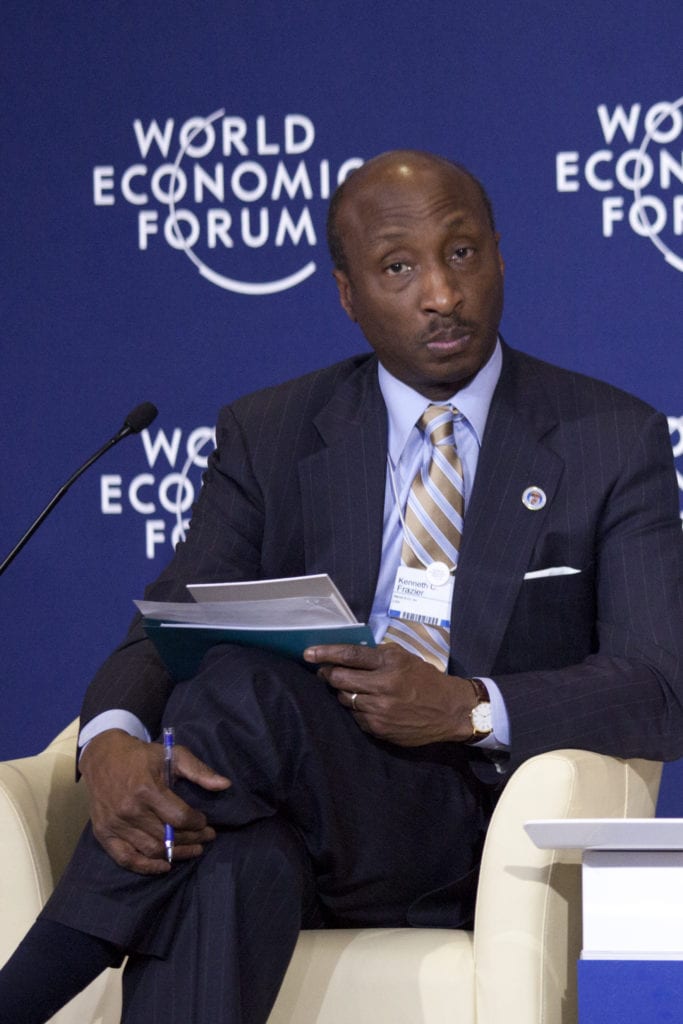di A. Altieri D’Angelo
in foto: Kenneth C. Frazier, chairman and chief executive of Merck & Co., was instrumental in organizing a statement opposing laws that restrict voting rights
Republican legislators are sending this message to corporate America. Republicans are angry that hundreds of large U.S. corporations and business leaders have issued a joint statement (We Stand For Democracy) criticizing Republican-sponsored, restrictive, and anti-democratic state voting law proposals. Many in corporate America oppose any discriminatory actions that make it harder for people to vote. They believe Republicans are attempting to prevent minorities and young people from casting ballots in order to stay in power. Their statement follows the decision by Major League Baseball to move its All-Star Game from Atlanta, Georgia to Denver, Colorado, in protest of Georgia signing a new election law. General Motors, Delta Airlines, and other companies have issued similar objections in their home states to stop legislators from implementing such proposals. Republicans are very unhappy about corporate America speaking out against them.
Mitch McConnell, Republican Minority Leader of the Senate, stated, “My warning, if you will, to corporate America is to stay out of politics. It’s not what you’re designed for. And don’t be intimidated by the left into taking up causes that put you right in the middle of America’s greatest political debates”. It is interesting to note that McConnell had been very active in seeking to unleash corporate American funding of political parties. It is ironic that he now is openly threatening companies that he considers to be interfering. He is biting the hand that feeds his Party!
Other Republicans have also threatened to punish any corporation that criticized their effort to enact restrictive voting laws. This clash is highly unusual. American businesses have had a very close relationship with the Republican Party (the Party) for over 100 years.
The Party was founded in 1854; it was also known as the Party of Lincoln. From 1854 through to the 1890s, the Party’s primary focus was ending slavery and empowering freed slaves to vote. In the early 20th century, the Party became more conservative when it came to social programs and evolved a policy of keeping the government small and taxes low. Smaller government meant little or no government regulation of businesses and higher after-tax income. The Party of Lincoln became a strong ally of American industry.
Corporate America has traditionally exercised its influence on Party policy by funding Republican candidates’ elections. However, corporations could only contribute a limited amount to political campaigns. A Supreme Court case eliminated the restrictions. In 2010, the Court stated that it was unconstitutional to limit corporate contributions. This decision opened the floodgates, and donations made directly or indirectly through legal entities (known as Super PACS) poured into the American electoral process. The Party was the principal beneficiary of that ruling and received hundreds of millions of dollars. And corporate American influence grew accordingly. The Party continued to push its business-friendly agenda without any public interference from its contributors. But corporate America is signaling that it must have more influence over the Party.
The change in approach by American business is due to the expectation, on the part of voters (particularly young voters) and an increasing number of corporate investors, that corporations must stand for a set of values. If a business fails to speak out on social issues, it runs a serious risk of losing revenue. As one commentator stated, “There’s a new era of expectations about social values — we call this the era of the public. People expect brands to contribute more to society. As a result, It’s much more salient to business leaders today than it was before.” It is also true that many CEOs feel they need to step in because the government is dysfunctional. Whatever the reason, corporate activism is becoming a Republican Party nightmare, and it will not go away anytime soon.
However, we cannot ignore the fact that corporate America is all about maximizing shareholder value. These same corporations will continue to seek to keep taxes low and try to eliminate, or at least minimize, government regulations. No one should assume that corporate America will adopt Democratic Party principles. They will do what is necessary to protect their bottom line.
But corporations would prefer not to be involved in social issues. The partisan nature of U.S. politics is drawing corporate America into a public role. They have to choose between their loyalty to a Party they no longer recognize and their consumers/stakeholders. In this case, Corporate America decided to send its own message to the Party: if you take our money, then you need to listen to us. If the Party ignores the warning, then it could lead to a realignment of the Party’s relationship with American businesses.
We live in interesting times.



















